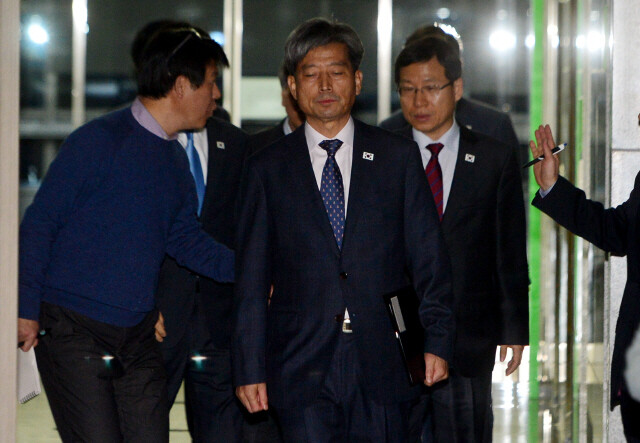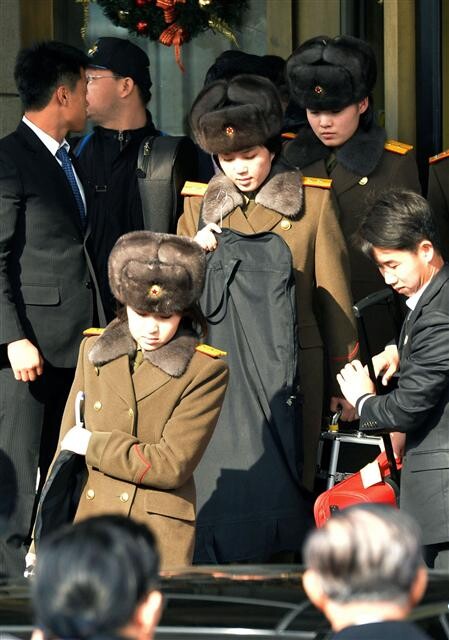hankyoreh
Links to other country sites 다른 나라 사이트 링크
[Analysis] Two developments could have big repercussions on Korean peninsula

Only a few hours apart on the afternoon of Dec. 11, there were two developments that could reverse the trend toward improving relations on the Korean Peninsula seen over the past few months.
One of these was the abrupt return to Pyongyang of North Korea’s Moranbong Band, just before it was scheduled to perform in Beijing in “concerts of amity between China and North Korea” (in the words of Song Tao, Head of the International Liaison Department of the Communist Party of China). The other was the breakdown of the first round of inter-Korean government talks, held for two days at the Kaesong Industrial Complex.
While the two events were separate and no doubt a number of factors played a role their occurrence, they are noteworthy considering that they both resulted from decisions made by Kim Jong-un, leader of North Korea.
The cancellation of the Moranbong concerts could slow or reverse the trend to normalize North Korea’s relations with China, which had accelerated after Liu Yunshan, a member of China’s Politburo Standing Committee, visited North Korea and met Kim on the 70th anniversary of the establishment of the Korean Workers’ Party (KWP) in October. In the same way, the failure of the inter-Korean government talks could weaken or erase the momentum of the agreement reached during the “two plus two” high-level inter-Korean talks held on Aug. 25.
The concerts of the Moranbong Band in Beijing - which were scheduled to take place from Dec. 12 to Dec. 14 - were not merely cultural exchange events.

North Korea put Choi Hwi, First Deputy Director of the KWP’s Central Committee, in charge of the visit to China by the Moranbong Band (which was accompanied by the State Merited Chorus), and the Chinese Communist Party’s International Liaison Department, which handles “party-to-party diplomacy,” was responsible for organizing the concerts in Beijing
This demonstrates that these concerts were political acts resulting from sophisticated calculations of state interests and that they were intended to promote exchange between the highest ranking officials in North Korea and China.
Song Tao said that the concerts were a “high priority,” while Hua Chunying, spokeswoman for China‘s Foreign Ministry, spoke highly of them as well, predicting that they would reinforce China and North Korea’s “tradition of amity.”
North Korean media also provided several days of extensive coverage to the concerts, which were to be the Moranbong Band‘s first performances overseas.
The Moranbong Band, which is composed of 10 women, was established on the orders of Kim Jong-un in 2012.
But the concerts were abruptly called off. Around midnight on Dec. 11, China’s official Xinhua News Agency attributed the cancellation to “a problem with communication between the staff.” North Korea has not provided any official explanation.
While there is rampant speculation about the cancellation, particular attention should be given to a recent claim by Kim Jong-un about hydrogen bombs. On page one of the Dec. 10 edition of North Korea‘s Rodong Sinmun newspaper, Kim was quoted as saying that North Korea is a “powerful nuclear state that can create the immense blast of a hydrogen bomb.”
Hua Chunying responded critically to Kim’s remarks, saying, “We hope that the country in question will do more to help in easing political tensions.”
It is nearly unprecedented for the spokesperson of China’s foreign ministry to openly criticize remarks by North Korea’s leader. This is why it must be assumed that Hwa’s remarks are in line with the views of Chinese President Xi Jinping and other members of China’s leadership.
“After Kim‘s claim to possess hydrogen bombs, China suggested that members of the Politburo would attend the concerts - lower in rank than members of the Politburo’s Standing Committee, which North Korea had requested. After being briefed about this, Kim instructed the Moranbong Band to return home,” a source in Beijing said on Dec. 12.
This suggests that disagreement over the hydrogen bomb remarks escalated into a quarrel about the rank of the Chinese officials who would attend the Moranbong Band‘s concerts, which shows that the long-standing dispute between China and North Korea on the nuclear issue was behind the cancellation of the concerts.
The outcome of the first round of inter-Korean government talks makes clear that there is a long way to go before there can be stable improvement in inter-Korean relations and that resuming tourism to Mt. Keumkang is the touchstone for such improvement.
During the talks, North Korea tied its primary concern, which is resuming tours to Mt. Keumkang, with South Korea’s primary concern, which is holding reunions for the divided families, and proposed that the two items be promoted and implemented simultaneously.
Arguing that the two issues cannot be linked, South Korean negotiators instead proposed working on initiatives related to the three areas of quality of life, environment, and culture as outlined in President Park Geun-hye’s Dresden Declaration; improving communications, customs, and transportation at the Kaesong Industrial Complex; and building a world ecological peace park in the demilitarized zone (DMZ).
Since there were no items on the agenda that allowed give and take - the basic prerequisite for holding negotiations and reaching an agreement - it was inevitable that the two sides would struggle to reach a consensus. It is particularly noteworthy that none of the offers made by South Korea were likely to be of interest to the North Korean negotiators.
It is difficult to guess how long the repercussions of the abrupt return of the Moranbong Band and the collapse of the inter-Korean government talks will last. However, considering that North Korea has announced that it will be convening the 7th Party Congress in early May 2016 - the first to be held in 36 years - it should be noted that the North has a considerable need for external stability.
There are predictions that governments in North and South Korea will take steps to lay new plans after reviewing what Kim Jong-un and Park Geun-hye say in their respective New Year’s addresses.
China and North Korea are expected to devote their attention to regrouping after the aftermath of the concerts’ cancellation, reflecting Korea Peace Forum President Jung Se-hyeon’s observation that the two have “a strategic relationship that is not weakened by emotions.” However, it is unclear how much time this will require.
By Lee Je-hun and Kim Jin-cheol, staff reporters and Seong Yeon-cheol, Beijing correspondent
Please direct questions or comments to [english@hani.co.kr]

Editorial・opinion
![[Column] Season 2 of special prosecutor probe may be coming to Korea soon [Column] Season 2 of special prosecutor probe may be coming to Korea soon](https://flexible.img.hani.co.kr/flexible/normal/500/300/imgdb/original/2024/0426/3317141030699447.jpg) [Column] Season 2 of special prosecutor probe may be coming to Korea soon
[Column] Season 2 of special prosecutor probe may be coming to Korea soon![[Column] Park Geun-hye déjà vu in Yoon Suk-yeol [Column] Park Geun-hye déjà vu in Yoon Suk-yeol](https://flexible.img.hani.co.kr/flexible/normal/500/300/imgdb/original/2024/0424/651713945113788.jpg) [Column] Park Geun-hye déjà vu in Yoon Suk-yeol
[Column] Park Geun-hye déjà vu in Yoon Suk-yeol- [Editorial] New weight of N. Korea’s nuclear threats makes dialogue all the more urgent
- [Guest essay] The real reason Korea’s new right wants to dub Rhee a founding father
- [Column] ‘Choson’: Is it time we start referring to N. Korea in its own terms?
- [Editorial] Japan’s rewriting of history with Korea has gone too far
- [Column] The president’s questionable capacity for dialogue
- [Column] Are chaebol firms just pizza pies for families to divvy up as they please?
- [Column] Has Korea, too, crossed the Rubicon on China?
- [Correspondent’s column] In Japan’s alliance with US, echoes of its past alliances with UK
Most viewed articles
- 1Division commander ordered troops to enter raging flood waters before Marine died, survivor says
- 2‘We must say no’: Seoul defense chief on Korean, USFK involvement in hypothetical Taiwan crisis
- 3Is N. Korea threatening to test nukes in response to possible new US-led sanctions body?
- 4No good, very bad game for Korea puts it out of Olympics for first time since 1988
- 5Korea’s 1.3% growth in Q1 signals ‘textbook’ return to growth, says government
- 6US overtakes China as Korea’s top export market, prompting trade sanction jitters
- 7[Column] Has Korea, too, crossed the Rubicon on China?
- 8[Column] ‘Choson’: Is it time we start referring to N. Korea in its own terms?
- 9Will NewJeans end up collateral damage in internal feud at K-pop juggernaut Hybe?
- 10Samsung subcontractor worker commits suicide from work stress